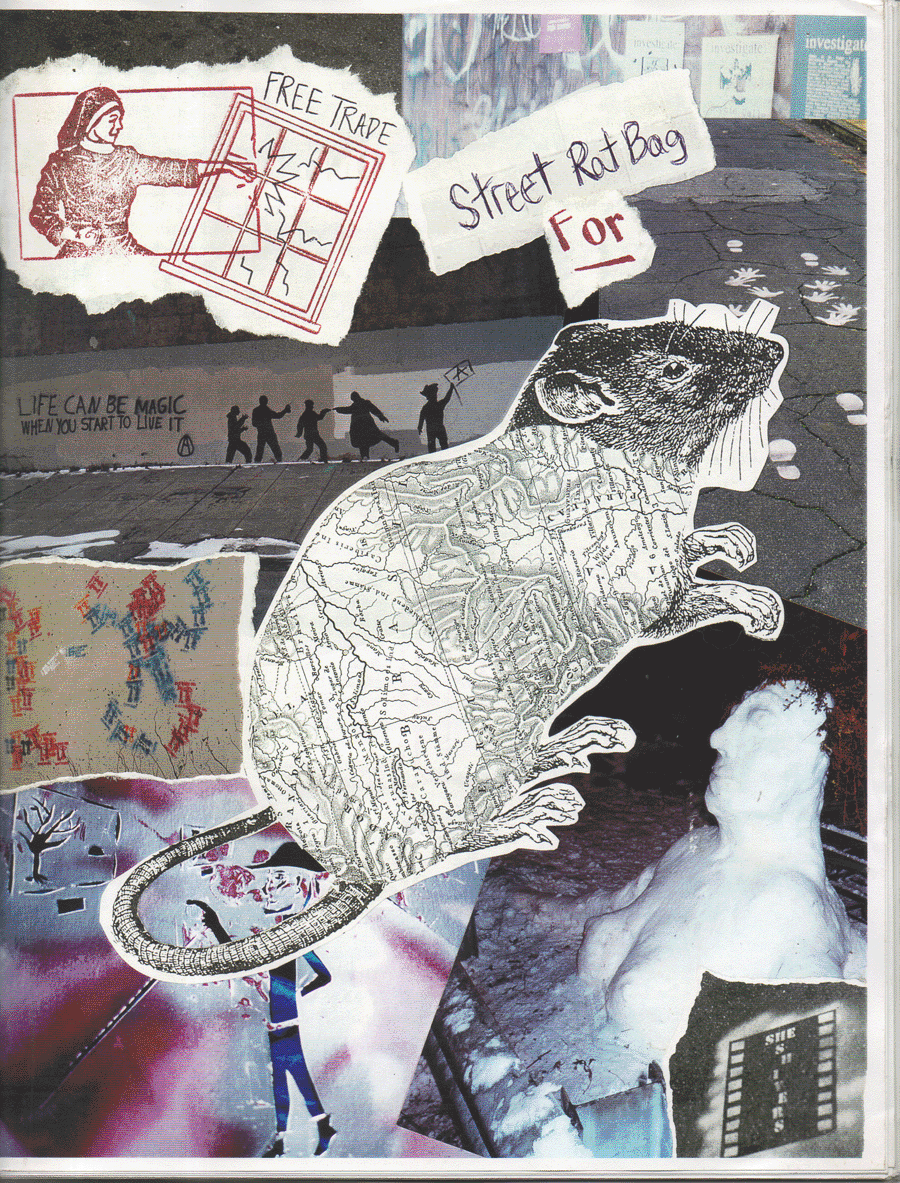
Interview with Amy Kwasnicki of PDAG & the R2K Legal Collective about the Resistance to the RNC
- 2000/2001
for Street RatBag 4
- conducted by RATical [aka tENTATIVELY, a cONVENIENCE]
[This interview was published already in "Street RatBag" issue 4 &, as such, is a lower priority for re-presenting than other perviously unpublished interviews. HOWEVER, the purpose of the "Interviewee" & "Interviewer" webpages is to collect together any & all interviews I've had a connection with (& can, therefore, feel more comfortable about sharing) & to disseminate them more widely.
The Street Ratbag was originally published in editions of 300 & may not have been widely read or reproduced. Since it's my opinion that they gave a very good look at the state of the (mostly) anarchist political activism at the time of their issuance that the editors were aware of, I consider them historically valuable. - August 23, 2014 note from tENTATIVELY, a cONVENIENCE]

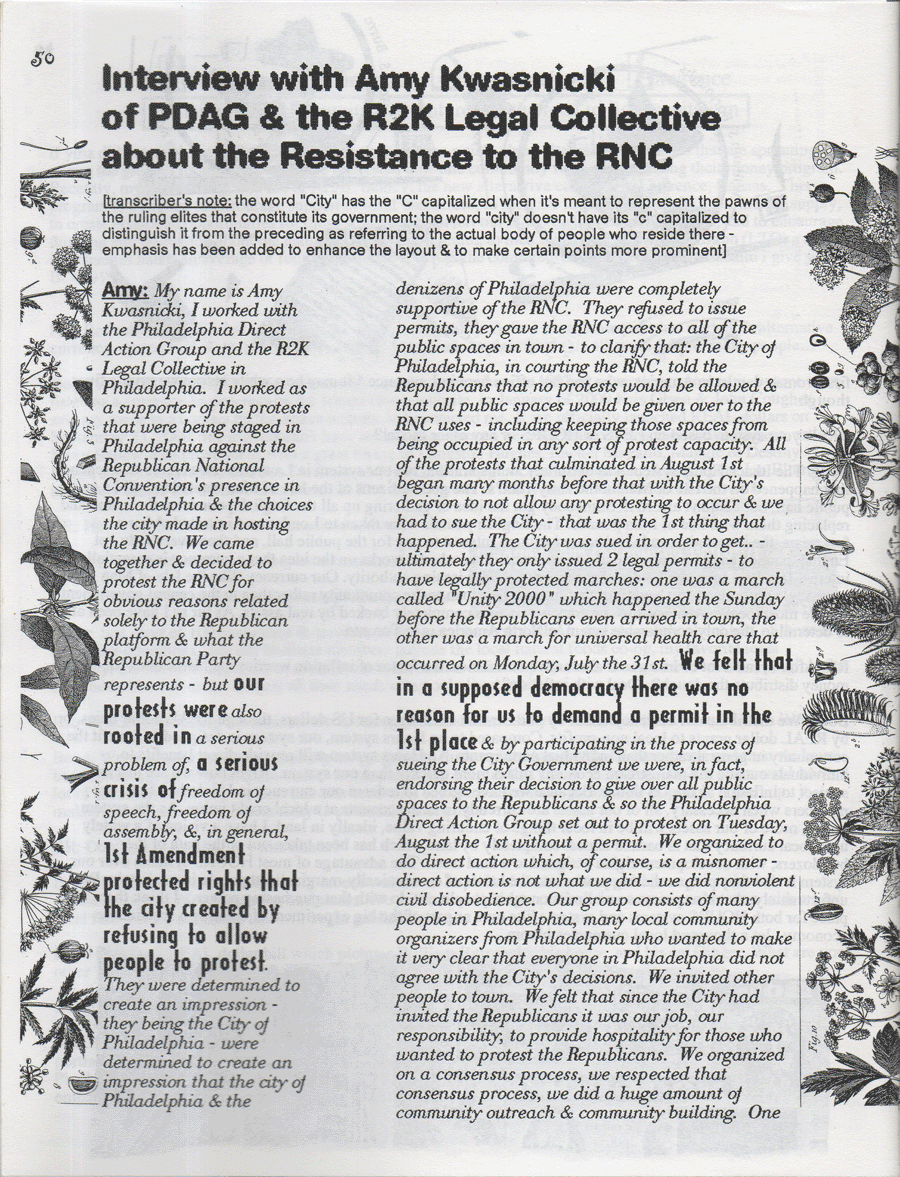
Interview with Amy Kwasnicki
of PDAG & the R2K Legal Collective about the Resistance to the RNC
[transcriber's note: the word "City" has the "C" capitalized when it's meant to represent the pawns of the ruling elites that constitute its government; the word "city" doesn't have its "c" capitalized to distinguish it from the preceding as referring to the actual body of people who reside there - emphasis has been added to enhance the layout & to make certain points more prominent]
Amy: My name is Amy Kwasnicki, I worked with the Philadelphia Direct Action Group and the R2K Legal Collective in Philadelphia. I worked as a supporter of the protests that were being staged in Philadelphia against the Republican National Convention's presence in Philadelphia & the choices the city made in hosting the RNC. We came together & decided to protest the RNC for obvious reasons related solely to the Republican platform & what the Republican Party represents - but our protests were also rooted in a serious problem of, a serious crisis of freedom of speech, freedom of assembly, &, in general, 1st Amendment protected rights that the city created by refusing to allow people to protest. They were determined to create an impression - they being the City of Philadelphia - were determined to create an impression that the city of Philadelphia & the denizens of Philadelphia were completely supportive of the RNC. They refused to issue permits, they gave the RNC access to all of the public spaces in town - to clarify that: the City of Philadelphia, in courting the RNC, told the Republicans that no protests would be allowed & that all public spaces would be given over to the RNC uses - including keeping those spaces from being occupied in any sort of protest capacity. All of the protests that culminated in August 1st began many months before that with the City's decision to not allow any protesting to occur & we had to sue the City - that was the 1st thing that happened. The City was sued in order to get.. - ultimately they only issued 2 legal permits - to have legally protected marches: one was a march called "Unity 2000" which happened the Sunday before the Republicans even arrived in town, the other was a march for universal health care that occurred on Monday, July the 31st. We felt that in a supposed democracy there was no reason for us to demand a permit in the 1st place & by participating in the process of sueing the City Government we were, in fact, endorsing their decision to give over all public spaces to the Republicans & so the Philadelphia Direct Action Group set out to protest on Tuesday, August the 1st without a permit. We organized to do direct action which, of course, is a misnomer - direct action is not what we did - we did nonviolent civil disobedience. Our group consists of many people in Philadelphia, many local community organizers from Philadelphia who wanted to make it very clear that everyone in Philadelphia did not agree with the City's decisions. We invited other people to town. We felt that since the City had invited the Republicans it was our job, our responsibility, to provide hospitality for those who wanted to protest the Republicans. We organized on a consensus process, we respected that consensus process, we did a huge amount of community outreach & community building. One of the many challenges that we had was the degree to which we permeated Philadelphia with our desire to protest the Republicans & - but not out of a false - we were not interested in tokenism, we did not want to recruit people for the sake of recruiting people but rather to really build something in our city - we did not want to just put alotof energy into a protest that would then end & the city itself would just go back &.. - we would go back to our little neighborhoods &.. - as would those we were working with.. - & so many things that we did not do that probably if we had done would have won for us the PR war faster, the Public Relations war faster in Philadelphia, but, by choosing to work very specifically & by putting alotof time into community building as a part of this protest the result has been phenomenal: the city of Philadelphia will never be the same in terms of the coalitions that have come out of the summer - nor will all the groups that worked together in Philadelphia.
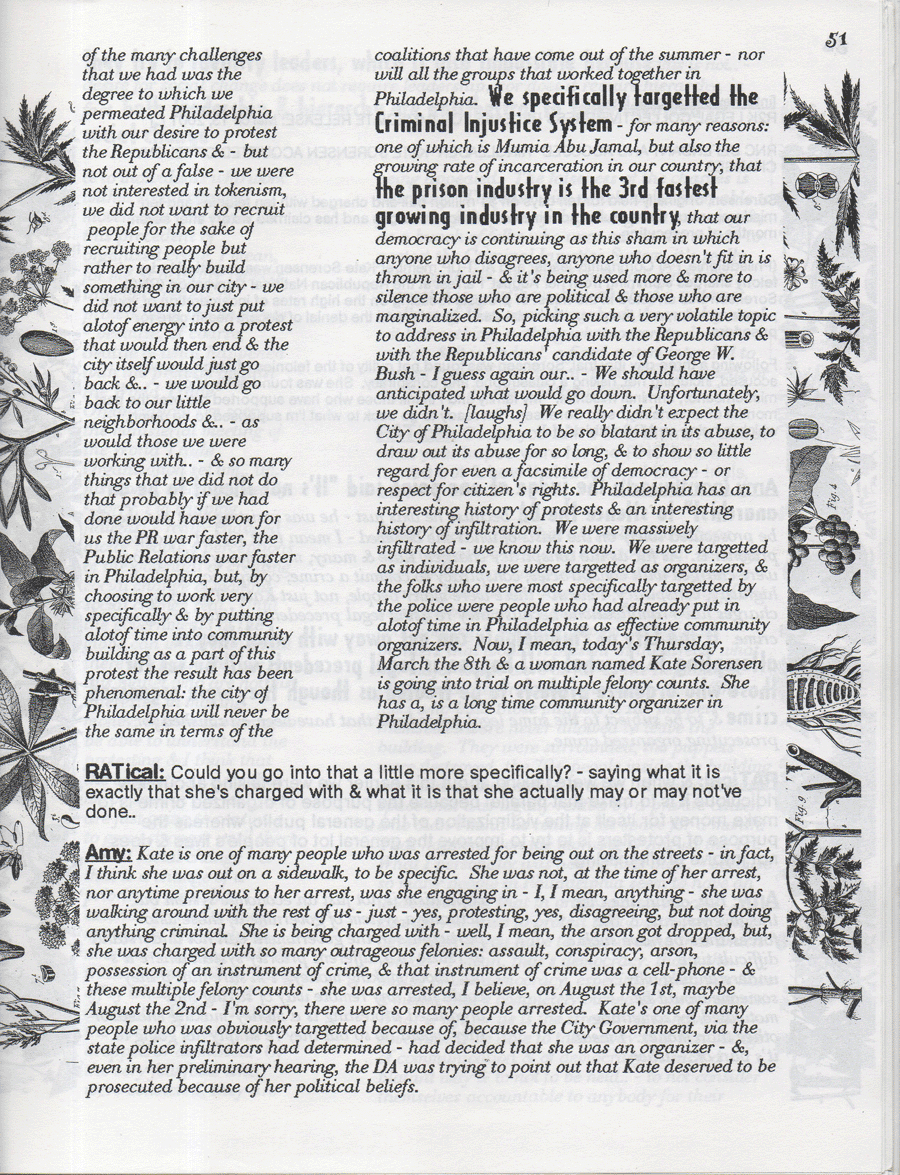
We specifically targetted the Criminal Injustice System - for many reasons: one of which is Mumia Abu Jamal, but also the growing rate of incarceration in our country, that the prison industry is the 3rd fastest growing industry in the country, that our democracy is continuing as this sham in which anyone who disagrees, anyone who doesn't fit in is thrown in jail - & it's being used more & more to silence those who are political & those who are marginalized. So, picking such a very volatile topic to address in Philadelphia with the Republicans & with the Republicans' candidate of George W. Bush - I guess again our.. - We should have anticipated what would go down. Unfortunately, we didn't. [laughs] We really didn't expect the City of Philadelphia to be so blatant in its abuse, to draw out its abuse for so long, & to show so little regard for even a facsimile of democracy - or respect for citizen's rights. Philadelphia has an interesting history of protests & an interesting history of infiltration. We were massively infiltrated - we know this now. We were targetted as individuals, we were targetted as organizers, & the folks who were most specifically targetted by the police were people who had already put in alotof time in Philadelphia as effective community organizers. Now, I mean, today's Thursday, March the 8th & a woman named Kate Sorensen is going into trial on multiple felony counts. She has a, is a long time community organizer in Philadelphia.
RATical: Could you go into that a little more specifically? - saying what it is exactly that she's charged with & what it is that she actually may or may not've done..
Amy: Kate is one of many people who was arrested for being out on the streets - in fact, I think she was out on a sidewalk, to be specific. She was not, at the time of her arrest, nor anytime previous to her arrest, was she engaging in - I, I mean, anything - she was walking around with the rest of us - just - yes, protesting, yes, disagreeing, but not doing anything criminal. She is being charged with - well, I mean, the arson got dropped, but, she was charged with so many outrageous felonies: assault, conspiracy, arson, possession of an instrument of crime, & that instrument of crime was a cell-phone - & these multiple felony counts - she was arrested, I believe, on August the 1st, maybe August the 2nd - I'm sorry, there were so many people arrested. Kate's one of many people who was obviously targetted because of, because the City Government, via the state police infiltrators had determined - had decided that she was an organizer - &, even in her preliminary hearing, the DA was trying to point out that Kate deserved to be prosecuted because of her political beliefs.
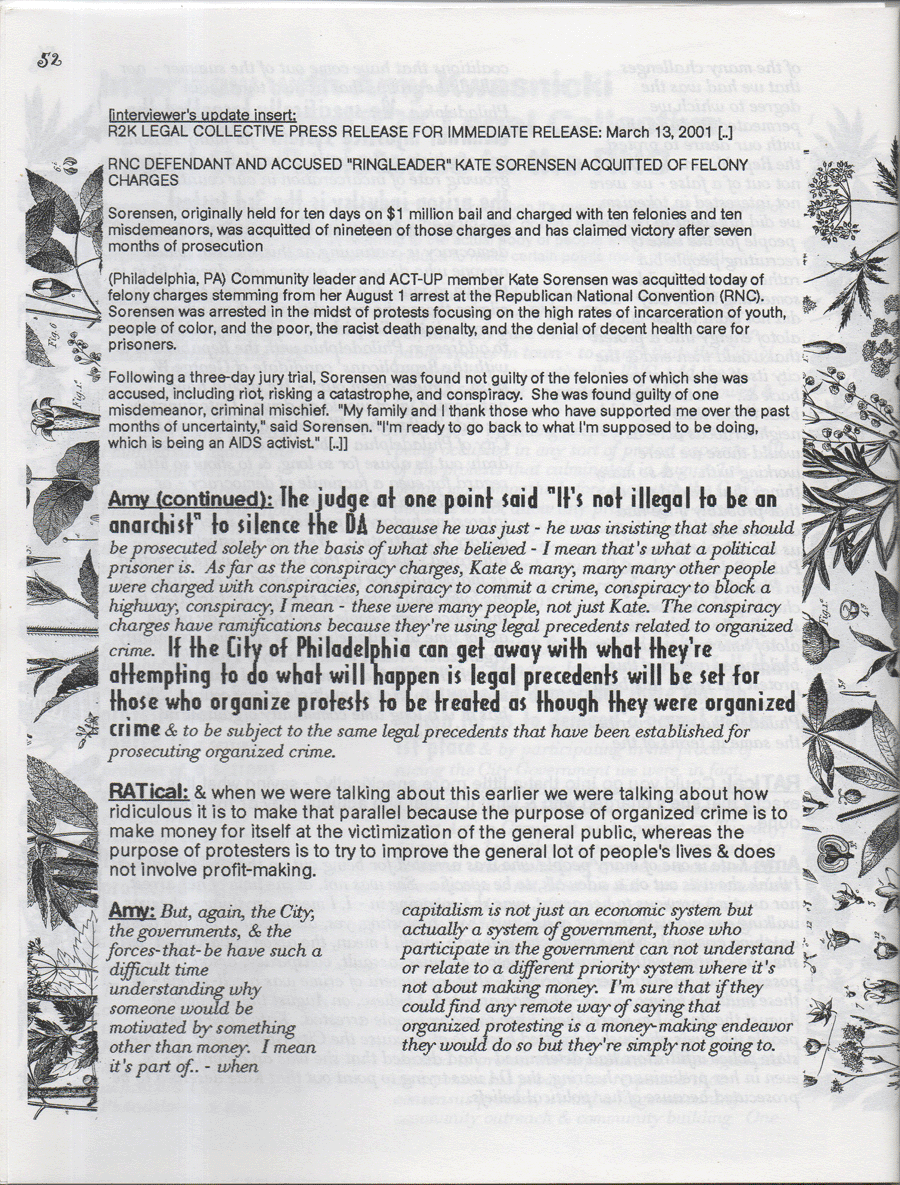
[interviewer's update insert:
R2K LEGAL COLLECTIVE PRESS RELEASE FOR IMMEDIATE RELEASE: March 13, 2001 [..]
RNC DEFENDANT AND ACCUSED "RINGLEADER" KATE SORENSEN ACQUITTED OF FELONY CHARGES
Sorensen, originally held for ten days on $1 million bail and charged with ten felonies and ten misdemeanors, was acquitted of nineteen of those charges and has claimed victory after seven months of prosecution
(Philadelphia, PA) Community leader and ACT-UP member Kate Sorensen was acquitted today of felony charges stemming from her August 1 arrest at the Republican National Convention (RNC). Sorensen was arrested in the midst of protests focusing on the high rates of incarceration of youth, people of color, and the poor, the racist death penalty, and the denial of decent health care for prisoners.
Following a three-day jury trial, Sorensen was found not guilty of the felonies of which she was accused, including riot, risking a catastrophe, and conspiracy. She was found guilty of one misdemeanor, criminal mischief. "My family and I thank those who have supported me over the past months of uncertainty," said Sorensen. "I'm ready to go back to what I'm supposed to be doing, which is being an AIDS activist." [..]]
Amy (continued): The judge at one point said "It's not illegal to be an anarchist" to silence the DA because he was just - he was insisting that she should be prosecuted solely on the basis of what she believed - I mean that's what a political prisoner is. As far as the conspiracy charges, Kate & many, many many other people were charged with conspiracies, conspiracy to commit a crime, conspiracy to block a highway, conspiracy, I mean - these were many people, not just Kate. The conspiracy charges have ramifications because they're using legal precedents related to organized crime. If the City of Philadelphia can get away with what they're attempting to do what will happen is legal precedents will be set for those who organize protests to be treated as though they were organized crime & to be subject to the same legal precedents that have been established for prosecuting organized crime.
RATical: & when we were talking about this earlier we were talking about how ridiculous it is to make that parallel because the purpose of organized crime is to make money for itself at the victimization of the general public, whereas the purpose of protesters is to try to improve the general lot of people's lives & does not involve profit-making.
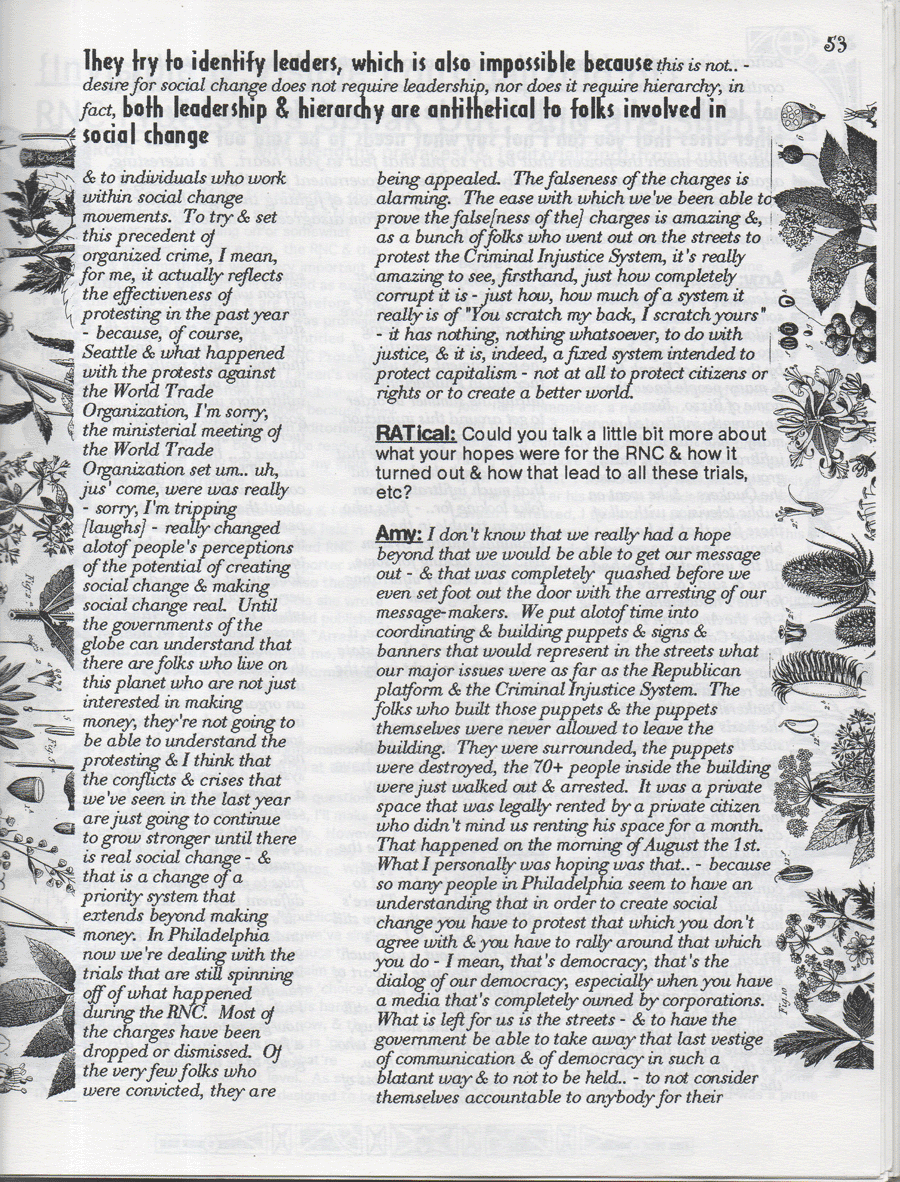
Amy: But, again, the City, the governments, & the forces-that-be have such a difficult time understanding why someone would be motivated by something other than money. I mean it's part of.. - when capitalism is not just an economic system but actually a system of government, those who participate in the government can not understand or relate to a different priority system where it's not about making money. I'm sure that if they could find any remote way of saying that organized protesting is a money-making endeavor they would do so but they're simply not going to. They try to identify leaders, which is also impossible because this is not.. - desire for social change does not require leadership, nor does it require hierarchy, in fact, both leadership & hierarchy are antithetical to folks involved in social change & to individuals who work within social change movements. To try & set this precedent of organized crime, I mean, for me, it actually reflects the effectiveness of protesting in the past year - because, of course, Seattle & what happened with the protests against the World Trade Organization, I'm sorry, the ministerial meeting of the World Trade Organization set um.. uh, jus' come, were was really - sorry, I'm tripping [laughs] - really changed alotof people's perceptions of the potential of creating social change & making social change real. Until the governments of the globe can understand that there are folks who live on this planet who are not just interested in making money, they're not going to be able to understand the protesting & I think that the conflicts & crises that we've seen in the last year are just going to continue to grow stronger until there is real social change - & that is a change of a priority system that extends beyond making money. In Philadelphia now we're dealing with the trials that are still spinning off of what happened during the RNC. Most of the charges have been dropped or dismissed. Of the very few folks who were convicted, they are being appealed. The falseness of the charges is alarming. The ease with which we've been able to prove the false[ness of the] charges is amazing &, as a bunch of folks who went out on the streets to protest the Criminal Injustice System, it's really amazing to see, firsthand, just how completely corrupt it is - just how, how much of a system it really is of "You scratch my back, I scratch yours" - it has nothing, nothing whatsoever, to do with justice, & it is, indeed, a fixed system intended to protect capitalism - not at all to protect citizens or rights or to create a better world.
RATical: Could you talk a little bit more about what your hopes were for the RNC & how it turned out & how that lead to all these trials, etc?
Amy: I don't know that we really had a hope beyond that we would be able to get our message out - & that was completely quashed before we even set foot out the door with the arresting of our message-makers. We put alotof time into coordinating & building puppets & signs & banners that would represent in the streets what our major issues were as far as the Republican platform & the Criminal Injustice System. The folks who built those puppets & the puppets themselves were never allowed to leave the building. They were surrounded, the puppets were destroyed, the 70+ people inside the building were just walked out & arrested. It was a private space that was legally rented by a private citizen who didn't mind us renting his space for a month. That happened on the morning of August the 1st. What I personally was hoping was that.. - because so many people in Philadelphia seem to have an understanding that in order to create social change you have to protest that which you don't agree with & you have to rally around that which you do - I mean, that's democracy, that's the dialog of our democracy, especially when you have a media that's completely owned by corporations. What is left for us is the streets - & to have the government be able to take away that last vestige of communication & of democracy in such a blatant way & to not to be held.. - to not consider themselves accountable to anybody for their behavior is something I don't think any of us were expecting. Now, as these trials continue to.. - as we continue to go thru the sequence of all these trials, we intend to not let them get away with it & to be an example for other folks in other cities that you can't not say what needs to be said out of fear - no matter how much the powers that be try to put that fear in your heart. It's interesting, again. it's all about money. It really seems like the government feels that by making it so economically challenging to protest - in terms of the cost of fighting the legal battles - that they will somehow or another dissuade people from disagreeing - which is impossible. It just empowers us to do more.
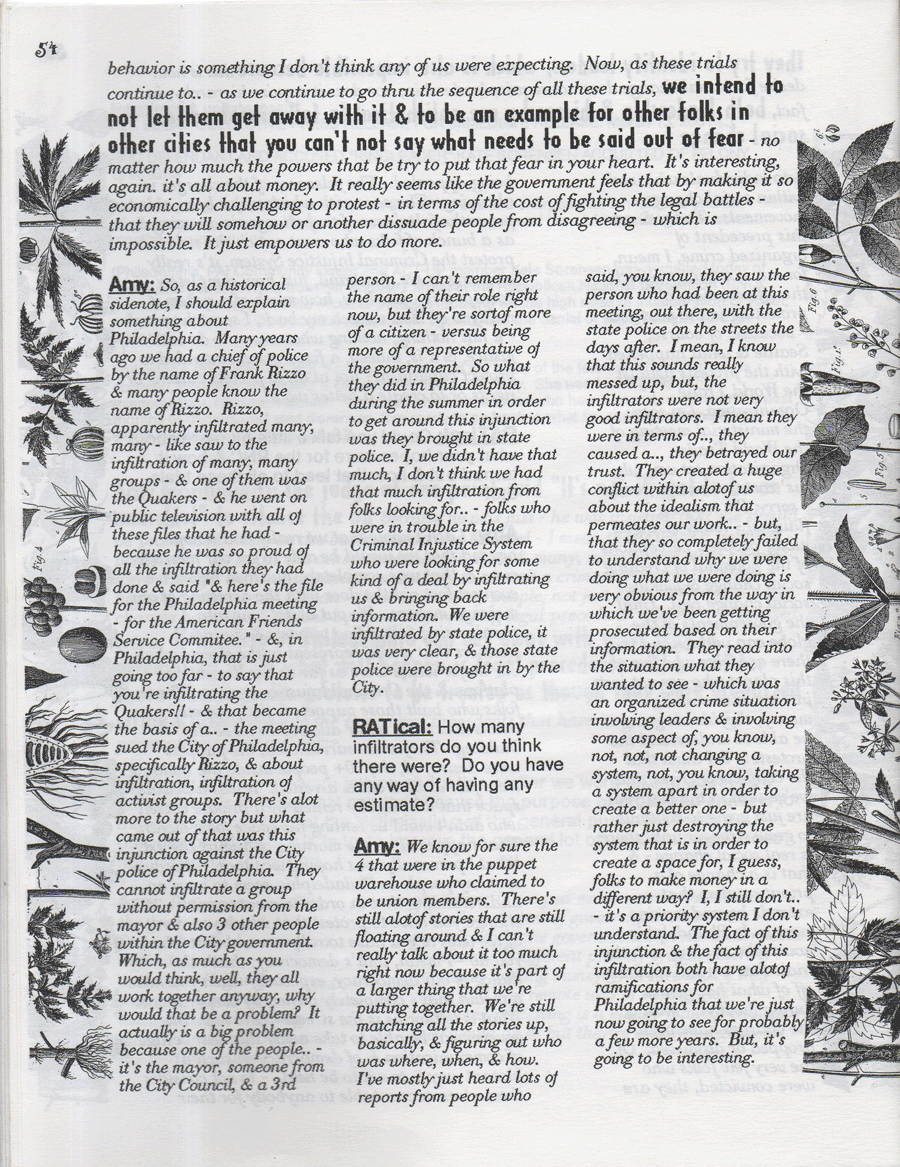
Amy: So, as a historical sidenote, I should explain something about Philadelphia. Many years ago we had a chief of police by the name of Frank Rizzo & many people know the name of Rizzo. Rizzo, apparently infiltrated many, many - like saw to the infiltration of many, many groups - & one of them was the Quakers - & he went on public television with all of these files that he had - because he was so proud of all the infiltration they had done & said "& here's the file for the Philadelphia meeting - for the American Friends Service Commitee." - &, in Philadelphia, that is just going too far - to say that you're infiltrating the Quakers!! - & that became the basis of a.. - the meeting sued the City of Philadelphia, specifically Rizzo, & about infiltration, infiltration of activist groups. There's alot more to the story but what came out of that was this injunction against the City police of Philadelphia. They cannot infiltrate a group without permission from the mayor & also 3 other people within the City government. Which, as much as you would think, well, they all work together anyway, why would that be a problem? It actually is a big problem because one of the people.. - it's the mayor, someone from the City Council, & a 3rd person - I can't remember the name of their role right now, but they're sortof more of a citizen - versus being more of a representative of the government. So what they did in Philadelphia during the summer in order to get around this injunction was they brought in state police. I, we didn't have that much, I don't think we had that much infiltration from folks looking for.. - folks who were in trouble in the Criminal Injustice System who were looking for some kind of a deal by infiltrating us & bringing back information. We were infiltrated by state police, it was very clear, & those state police were brought in by the City.
RATical: How many infiltrators do you think there were? Do you have any way of having any estimate?
Amy: We know for sure the 4 that were in the puppet warehouse who claimed to be union members. There's still alotof stories that are still floating around & I can't really talk about it too much right now because it's part of a larger thing that we're putting together. We're still matching all the stories up, basically, & figuring out who was where, when, & how. I've mostly just heard lots of reports from people who said, you know, they saw the person who had been at this meeting, out there, with the state police on the streets the days after. I mean, I know that this sounds really messed up, but, the infiltrators were not very good infiltrators. I mean they were in terms of.., they caused a.., they betrayed our trust. They created a huge conflict within alotof us about the idealism that permeates our work.. - but, that they so completely failed to understand why we were doing what we were doing is very obvious from the way in which we've been getting prosecuted based on their information. They read into the situation what they wanted to see - which was an organized crime situation involving leaders & involving some aspect of, you know, not, not, not changing a system, not, you know, taking a system apart in order to create a better one - but rather just destroying the system that is in order to create a space for, I guess, folks to make money in a different way? I, I still don't.. - it's a priority system I don't understand. The fact of this injunction & the fact of this infiltration both have alotof ramifications for Philadelphia that we're just now going to see for probably a few more years. But, it's going to be interesting.
idioideo at verizon dot net
to the tENTATIVELY, a cONVENIENCE as Interviewer page
to the tENTATIVELY, a cONVENIENCE as Interviewee page
to the tENTATIVELY, a cONVENIENCE movie-making "Press: Criticism, Interviews, Reviews" home-page
to the "tENTATIVELY, a cONVENIENCE - Sprocket Scientist" home-page
to the "FLICKER" home-page for the alternative cinematic experience
to find out more about why the S.P.C.S.M.E.F. (Society for the Prevention of Cruelty to Sea Monkeys by Experimental Filmmakers) is so important
for info on tENTATIVELY, a cONVENIENCE's tape/CD publishing label: WIdémoUTH
to see an underdeveloped site re the N.A.A.M.C.P. (National Association for the Advancement of Multi-Colored Peoples)